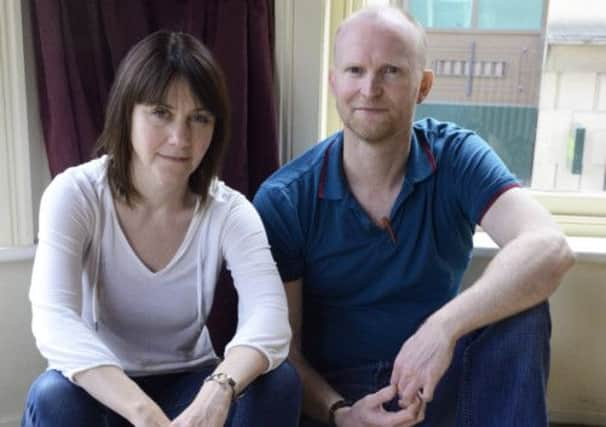Hammer and giggle as Soviet satire gets makeover


A black comedy set in 1920s Soviet Russia might not, on the face of it, seem like the perfect match for Halifax-based touring company Northern Broadsides, but in the hands of playwright Deborah McAndrew they could have another hit on their hands.
Her adaptation of Gogol’s A Government Inspector was a great success for the company last year.
Advertisement
Hide AdAdvertisement
Hide Ad“It came out of the blue really,” says McAndrew whose latest work, The Grand Gesture, will receive its premiere at Harrogate Theatre tonight.
“A friend who knows a lot about Russian theatre recommended it and I knew pretty quickly that I wanted to do it. When I was reading it, the characters just seemed so alive to me. ”
The Grand Gesture is “freely adapted” from Nikolai Erdman’s dark comic classic The Suicide, written and set in Russia in the 1920s and widely regarded as one of the finest plays of the Soviet era. McAndrew has transposed the story to 21st century Britain and set it amongst the North’s Anglo-Irish community.
Where the original had a rural setting, McAndrew’s is urban and music will play an important part in the piece with an Irish gipsy band as well as a “heavenly choir” providing accompaniment to the action.
Advertisement
Hide AdAdvertisement
Hide Ad“The play is so funny and very moving,” she says. “The premise is completely absurd, but it’s quite profound in some ways – it’s about a man who goes through an extraordinary epiphany really.
“Like all great works of art, it’s difficult to pin down exactly what makes it great, but when you read it you think ‘no wonder Stalin suppressed it’. It is so full of goodness and that is frightening to wicked people.”
McAndrew’s adaptation follows the fortunes of Simeon Duff, who is out of work, penniless and desperate. After a failed attempt to solve his problems by learning how to play the tuba, he ultimately feels that there is only one way out – to take his own life.
However, once word gets around the community, everyone wants to get involved. His death might not be in vain if it is transformed into some grand gesture. There is a jostling for position as various groups attempt to claim his suicide for their own noble cause. Will his death be for the sake of love, politics, religion or the rising price of fish?
Advertisement
Hide AdAdvertisement
Hide Ad“There is a sense that the individual is a commodity – and that isn’t confined to the original play’s time and place, there is a universality about it,” says McAndrew.
“Anyone who knows The Suicide in Russian will see the same play. It’s still Erdman’s amazing imagination and I claim no credit for the wonderful situation and characters he created. ”
McAndrew worked with a Russian academic to explore the rhythms of the language and to understand some of the jokes better – translating puns and other wordplay from another language can be a minefield.
There is one character, for example, who speaks in malapropisms. These can’t be directly translated and have to be adapted in order to make sense – and be humorous – to an English audience. Also, the original has a cast of thirty – plus a church choir – and McAndrew’s brief for Northern Broadsides is to write for eleven actors which, she says, has been an enjoyable logistical challenge.
Advertisement
Hide AdAdvertisement
Hide Ad“I’ve had to cut characters and move things around and I’ve amalgamated two characters to make one. I have done something different with an offstage figure and there is quite a lot of doubling.”
She sees the play as a heart-warming satire that provides the perfect antidote to austerity Britain and reaffirms the value of community.
“It seems like a macabre subject and the comedy is very black at times,” says McAndrew.
“But ultimately it affirms both the dignity and worth of every human life and the collective responsibility we have for each other.”
Advertisement
Hide AdAdvertisement
Hide AdAlthough still probably best known for playing Angie Freeman in Coronation Street – and she still does act, mostly in radio dramas – McAndrew considers herself these days to be more of a playwright.
“Once I focused on the writing, I thought ‘this is what I am going to do’,” she says. “I’ve been doing it for 12 years now and I love it.” Her plays have been performed all over the UK and she has worked with other theatre companies including Huddersfield-based Mikron and the Bolton Octogon.
Working with Northern Broadsides, however, is always “very special” and creating The Grand Gesture has been particularly satisfying. “I think I would have liked Nikolai Erdman, his warmth and humanity come through,” she says. “I would have liked to have had a drink with him.”
Credits of actress turned writer
Deborah McAndrew studied drama at Manchester University before embarking on a career in acting.
Advertisement
Hide AdAdvertisement
Hide AdShe played the role of young designer Angie Freeman in Coronation Street from 1990 to 1998.
Her first break as a writer came in 2004 when Northern Broadsides produced her adaptation of The Bells by Leopold Lewis.
Writing credits include Losing the Plot (2012), Flamingoland (2008), and Accidental Death of an Anarchist (2008).
The Grand Gesture, Harrogate Theatre, Sept 6-21. Tickets 01423 502116.